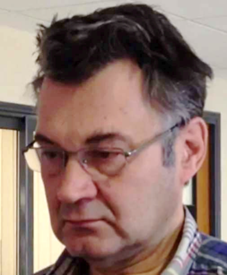Christos Papaioannou (1958 - 2025)

After a brief fight with multiple organ failures and just when we thought that he was recovering, our good friend and colleague, Dr. Christos Papaioannou, passed away on the 28 th of April 2025 from heart failure at the age of 67, just a few months before his official retirement.
Christos was a true city child, born 11 th of February 1958, in the city of Thessaloniki, which he never left. Despite his difficult childhood, as he lost his father at a young age, he finished his B.Sc. in Geology, in 1982. His undergraduate studies provided him with a challenge and an opportunity: The large M 6.5 1978 Thessaloniki (Mygdonia basin) earthquake delayed his study progress but at the same time allowed him to work under Prof. B. Papazachos, his future supervisor and mentor, as a member of the post- mainshock fieldwork team. Christos worked on the collection of damage information and the compilation of macroseismic intensity maps. Fascinated by seismology and with the support of a Bodossaki Foundation fellowship, he proceeded to receive a PhD in probabilistic hazard assessment from the Aristotle Univ. of Thessaloniki, in 1985.
Christos continued his career as a research fellow and later as a permanent member
of the recently founded Geophysical Laboratory of the Aristotle Univ. of Thessaloniki
until 1995, working mainly for the operation of AUTh’s Seismological Network. He then
joined ITSAK (Institute of Engineering Seismology and Earthquake Engineering), also
in Thessaloniki, where he gradually advanced up to the position of Research Director.
While always based in Thessaloniki, he spent a lot of time as a visiting researcher in
several institutes, universities and corporate business related to seismic hazard such
as IZIIS, Univ. Joseph Fourier Grenoble, Institute of Geophysics Frankfurt, NEIC &
CIRES US, Risk Engineering Inc, INGV Rome, etc. He also participated in a large
number of post-mainshock monitoring network installations, working with both weak-
and strong-motion data. His research interests orbited mainly around Engineering
Seismology topics such as PSHA, macroseismic data, historical seismology, as well as
seismic sequences, seismotectonics and log-term probabilistic earthquake prediction.
He was coordinator and PI for 50+ projects with EU and/or national funding.
While Christos was an active researcher, publishing more than 50 papers in several
journals, his research contribution was pivotal in two topics:
• He pioneered probabilistic seismic hazard assessment in Greece, generating in the process important “ingredients” for PSHA analysis with B. Papazachos and other colleagues, such as a large number of crustal and intermediate-depth zonation models, GMPEs, seismotectonic models, etc. He was the first in Greece to attempt (as early as in the late 90s) to combine faults and area sources for PSHA analysis. Due to his experience, he was the longest present member in all national committees responsible for the updates of the Greek Hazard Seismic Code, having a critical contribution to its last 2 major updates. Considered as an expert in seismic hazard, he was appointed coordinator of the ESC working group on Seismic Hazard between 2000 and 2006.
•He meticulously collected, organized and published historical macroseicmic information for the broader Aegean area. Due to his extended work and efforts, he participated in the publication of a large number of national macroseismic atlases and historical earthquake catalogues, including a dedicated book on the earthquakes of Cyprus, providing valuable information to future generations of seismologists and engineers.
Christos will always be remembered for his vivid and joyful personality. Supported by his loud voice, laughter and “intense” sense of humor, he would constantly tease those around him. Within a few minutes, he could make you laugh constantly or simply burn you up! Known within the European seismological community as "Christos" ("there is only one Christos" said a colleague for him), he was always a people’s person at all conferences and meetings he attended, before being prematurely aged by the disease that plagued him.
Costas Papazachos, Aristotle University of Thessaloniki, Greece
